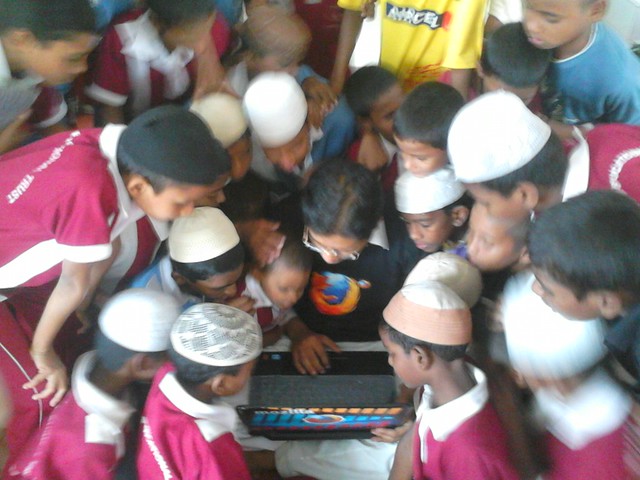StoryEngine’s human impact narratives illuminate different aspects of a healthy internet:
- Privacy & Security — People should have the ability to choose who knows where they go and what they do. These stories touch on the tools and the fight for policies that respect people’s identity and data across the internet. They show how people understand and can meaningfully control how their data is collected and used online, and dig into how companies and governments protect people’s data and enhance their ownership over their digital identities.
- Open Innovation — Everyone deserves the ability to create and compete online without paying for permission. These stories touch on open practices, technologies, and standards that create opportunities for people to innovate collectively through shared ideas and code.
- Decentralization — When just a few organizations and governments controlling the majority of online content and access, the vital flow of ideas and knowledge is blocked. These stories illuminate the challenges and successes surrounding Mozilla’s work to champion an internet that belongs to the people. They touch on issues like interoperability, open standards, and people’s expectations around systems that allow for seamless flow and transfer of information and content.
- Digital Inclusion — The quality of the internet is a reflection of the diversity of the people who are able to access and contribute to it. These stories touch on technologies, policies, and outreach programs that welcome all people online — regardless of race, income, nationality, or gender. They show what happens when people have the opportunity to access and shape our digital world.
- Web Literacy — Everyone should have the skills to read, write, and participate in the digital world. These are stories about technologies and education programs that lift everyone’s online skills — so that they can go beyond consuming and contribute to the future of the internet. They provide examples of informed digital citizens creating, shaping, and defending the web.

Web Literacy
People have the skills to read, write and participate in the digital world. Together, these informed digital citizens move beyond just consuming content — to creating, shaping and defending the web.
Metrics
- People understand what web literacy is and why it’s important, through compelling definition and case studies
- Case studies drawn from Mozilla Webmaker research + focus group data from Web Literacy Map update
- Greater awareness of who’s tackling web literacy (Mozilla + allies) and how
- Global awareness of the internet, including public perception and individual use

Online Privacy & Security
People understand and can meaningfully control how their data is collected and used online — and trust that it’s safe. Companies and governments work to protect our data and enhance our ownership over our digital identities.
Metrics
- % of web traffic / web sites using HTTPS
- # of security vulnerabilities triggering major news headlines + # people impacted
- People feel they have control over how personal information is collected and used by companies (from Pew surveys, etc.)
- Estimated # of companies that maintain a database about you — but with whom you have no relationship
- % of people who feel confident that they understand what information is being collected about them / how their information would be used (from surveys, etc.)

Open Innovation
Open is the default. Open source and open standards continue to be at the heart of the Internet, and influence organizations and industries products, policies and practices. As a result, entrepreneurs and everyday Internet users can create, innovate and compete online without asking permission.
Metrics
- Global web blockages by governments, including denial of service attacks, censorship, and other filtering
- Level of corporate censorship on the Internet / digital media
- % of VC tech investment built on open platforms vs closed platforms

Digital Inclusion
People everywhere can access and have the opportunity to participate in building the entire internet. Everyone on the internet has the opportunity to access and shape our digital world. The internet reflects the diversity of the people who use it.
Metrics
- # countries with policies promoting free or low cost internet access
- % of individuals using the Internet — disaggregated by identifiers like income level, gender, age
- economic barriers / differences in digital access for low income versus high income people
- # of hours worked at average wage to pay for one month broadband connection
- language makeup of the web; share of Internet content languages, respective to Internet population
- accessibility; level or % of accessible content, % of websites compatible with speech-to-text software, etc.

Decentralization
The technologies and platforms people use every day are interoperable and based on open standards. People expect and demand systems that allow seamless flow and transfer of information and content.
Metrics
- consolidation. monitoring market concentration, monopoly and data portability in key sectors like e-commerce, social, email, search, travel, media storage, online advertising, device / electronics manufacturing
- tracking market share, market entry costs, # of acquisitions and/or total spend on acquisitions by the largest market share holders
- data portability. number of, and % of market share held by, companies in each category that offer a) full or near-full data portability; b) some data portability; c) no data portability.
- user data market share estimates: est of total amount of data that’s collected from users by the segment as a whole, and estimate of what % of that data is collected by each company.
